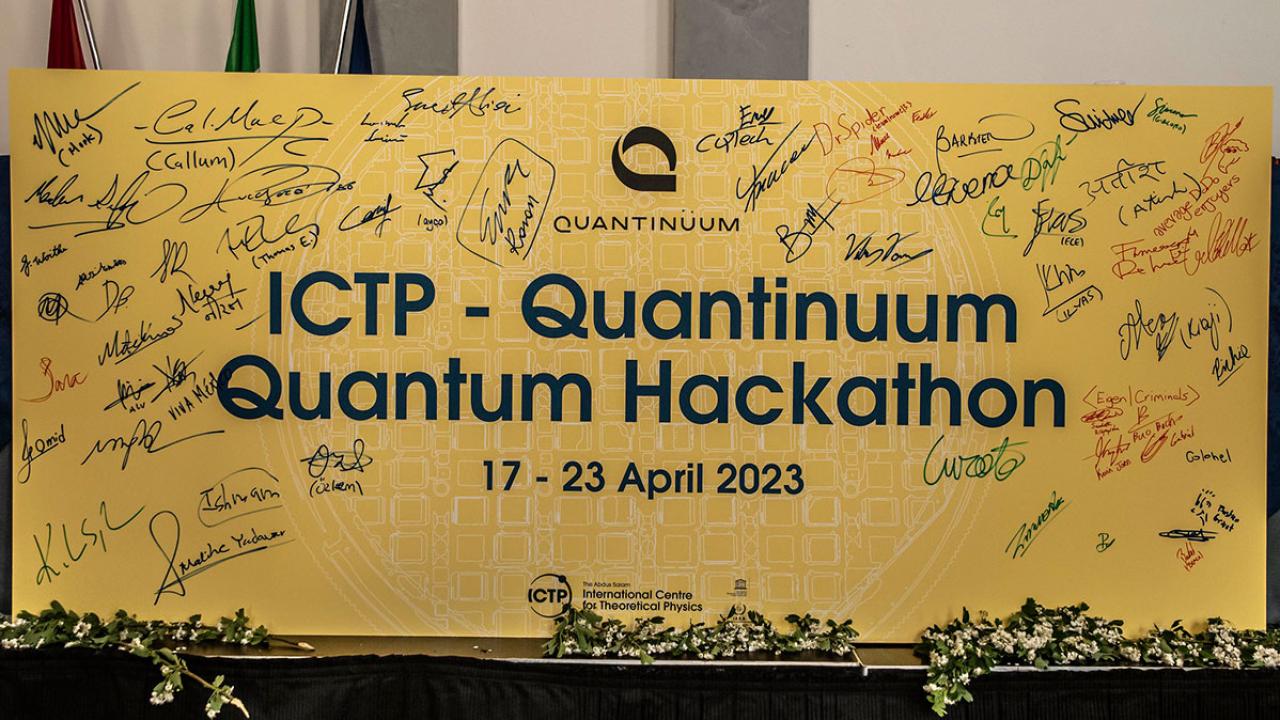
Students from across the globe travelled to ICTP last week to work together and learn about quantum computing at the ICTP-Quantinuum Hackathon. Participants from the end of their undergraduate studies all the way up to post-doctoral researchers were introduced to innovative techniques and ideas by tutors from both ICTP and industrial partners such as international quantum computing company Quantinuum.
The event culminated in a two-day coding competition, in which participants were divided into teams of five, each with an industrial mentor. As opposed to a typical hackathon, in which all competitors solve the same problem, each team was given a different quantum computing task to complete using technologies and software developed by Quantinuum. The teams presented their solutions to a jury and four winners were selected, each receiving prizes such as Kindle e-readers and book vouchers.
The winners were:
1st place :
Winners: EigenCriminals
Bao Bach, Saaketh Rayaprolu, and Kevin Noriega.
“Solving Combinatorial Optimization Problems using F-VQE”
Mentor: Gabriel Marin (Quantinuum)
Winners: Cat State (ket alpha, ket minus alpha)
Bence Bako, Attila Portik, Vikaas Varma, Kimberley Worrall, Bastien Grivet.
"Building fault-tolerant protocols"
Mentor: Ciarán Ryan-Anderson (Quantinuum)
2nd place:
Winners: Call of Qrylov
Abbas Hassasfar, Malihe Yadavar, Shah Ishmam Mohtashim, Alberto Ruiz Biestro, Edgar Andrés Hernandez Moreno.
“Quantum Krylov Method”
Mentor: Nathan Fitzpatrick (Quantinuum)
Winners: Team 3
Lakshika Rathi, Idris Kouadri Boudjelthia, Francesco Slongo, Mauro Rigo, Federico Caretti.
"Classification of Adverse Events / Adverse Drug Reactions Signals using Quantum Natural Language Processing"
Mentors: Thomas Ehmer, Aleksandar Vuckovic (Merck) Luca Mondada (Quantinuum)
ICTP Director Atish Dabholkar spoke at the prize-giving and underlined the importance of this developing field, stating, “Quantum computing and quantum information theory is the next frontier.” He added that at events like this, students “can learn to discuss science at the highest level.”
“This is really something to be proud of. And in the years ahead, the seeds that you have planted will become a forest,” said Quantinuum founder and vice chair Ilyas Khan in his speech to the participants. “There are people all over the world following the event on social media, sending us text messages and photographs. There's an army behind each one of these people here, cheering them on, and they're all very proud of what these students are doing.”
The way in which quantum computing technologies are developed and deployed will likely have a significant effect on society. “Quantum computing is an industrial revolution, more of an industrial revolution than those that took place in the past. This is bigger than those,” added Khan. “We cannot allow ourselves to make the same mistakes of the last 200 years, when technology was used for profit. What matters is that in this next industrial revolution, we do something for the good of humanity. ICTP founder Abdus Salam said, ‘scientific thought and creation is the common and shared heritage of all of mankind, regardless of your race, regardless of gender, regardless of job."
“The ICTP-Quantinuum Hackathon event brought together 90 participants from 23 countries, creating a unique and inspiring atmosphere for all involved,” says Alexandre Krajenbrink from Quantinuum. “As the co-founder of non-profit organization QuantX, which has been organizing quantum hackathons for three years, I can confidently say that this event was truly special. The combination of a course on quantum computing followed by a hackathon, where real-life challenges were set by eight major corporations, allowed for collaboration and innovation in a way that is rarely seen.”
“The participation of students from all over the world was made possible thanks to the incredible support of ICTP, whose status as a United Nations organization allowed us to welcome students from every corner of the globe. For some of them, this was their first time leaving their country, and the experience of being a part of such a groundbreaking event left them feeling empowered and inspired,” added Krajenbrink.
"These kinds of events have always been an adventure; to gain new skills in a meeting place for people from different backgrounds,” says Kaan Yurtseven, an ICTP-sponsored participant from Turkey. “I hoped to learn different and advanced technical skills from the quantum computing world with the help of great mentors and team members."
The event comprised both lectures and workshops prior to the coding competition. “My main take-home from the event is that this kind of format works; where we essentially mix a classical educational part, with lectures and courses, with this kind of practical component,” says Jean Barbier, co-organiser and MATH and QLS research scientist at ICTP. ” This idea of hackathons, which is usually associated with coding, can be exported to maths or physics, according to Barbier. “For example, we're already planning a 'mathcathon' with lectures about modern mathematics, forming teams to work on a mathematical question with a mentor on for a few days, and maybe also writing two page articles for a proceedings.”
















